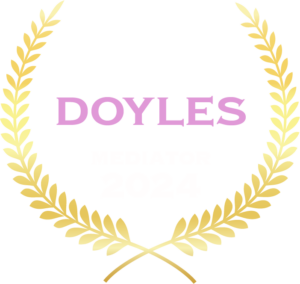When you have decided that mediation is appropriate for your matter and you have prepared and are ready to attend at mediation, it is important to understand the role that the mediator plays in assisting you with your dispute.
Generally, there are two types of mediators. Most mediators are registered as Nationally Accredited Mediators. This means that they have completed the required training to be recognised as a mediator in Australia.
A Family Dispute Resolution Practitioner is a mediator who has undertaken specialised training to facilitate mediations for parenting matters. A Family Dispute Resolution Practitioner [FDRP] has completed specialised training that allows for the registration of their qualifications with the Department of Attorney General and Justice and authorises them to issue certificates under the Family Law Act for parenting matters.
Generally, a mediator and FDRP can facilitate a mediation in both property and parenting matters. However, it is only the FDRP who can issue a certificate confirming that the parties have made a genuine attempt to resolve their matter before commencing proceedings in the Family Court.
The role that a mediator or FDRP plays is that all of the independent facilitator. When you attend at mediation, it is likely that you will want to argue your case to the mediator in the hope that they will take your side and then convince the other party to agree to your terms. That is not the role of the mediator or FDRP.
Sometimes, a party will attend mediation without the benefit of having had independent legal advice. They might ask the mediator for their view or opinion about the matter. They might seek advice from the mediator or FDRP. This is not the role of the mediator or FDRP.
The role of the mediator or FDRP is strictly one of facilitator. The purpose of mediation is to provide a forum where parties can meet with an independent third party to discuss the issues in their case with a view to reaching an agreement. The mediator’s role in this process is to listen to both parties understand their issues and assist the parties to work together towards an agreement.
A mediator or FDRP cannot and should not give legal advice or strategic advice regarding a party’s matter. To do so, would put them in a position of conflict and in a position where they are not effectively undertaking their role to facilitate a discussion between the parties.
If you need independent advice then you should obtain that from a lawyer practicing in family law, before you attended the mediation. You should fully understand how the law operates in your matter and the likely outcomes you can expect.
It is also usually not the role of the mediator or FDRP to draft the agreement that the parties reached however, it will ultimately depend on the type of the agreement and the basis on which the parties have engaged the mediator to assist them. If an agreement is reached and it is prepared by the mediator, the mediator will recommend that each party obtain independent legal advice about the process and the outcome in circumstances where it is not the role of a mediator or FDRP to provide legal advice about any agreement reached.
If you would like more information about the role of a mediator or Family Dispute Resolution Practitioner , please contact our office for further information or seek independent legal advice from the lawyer assisting you in your matter.

